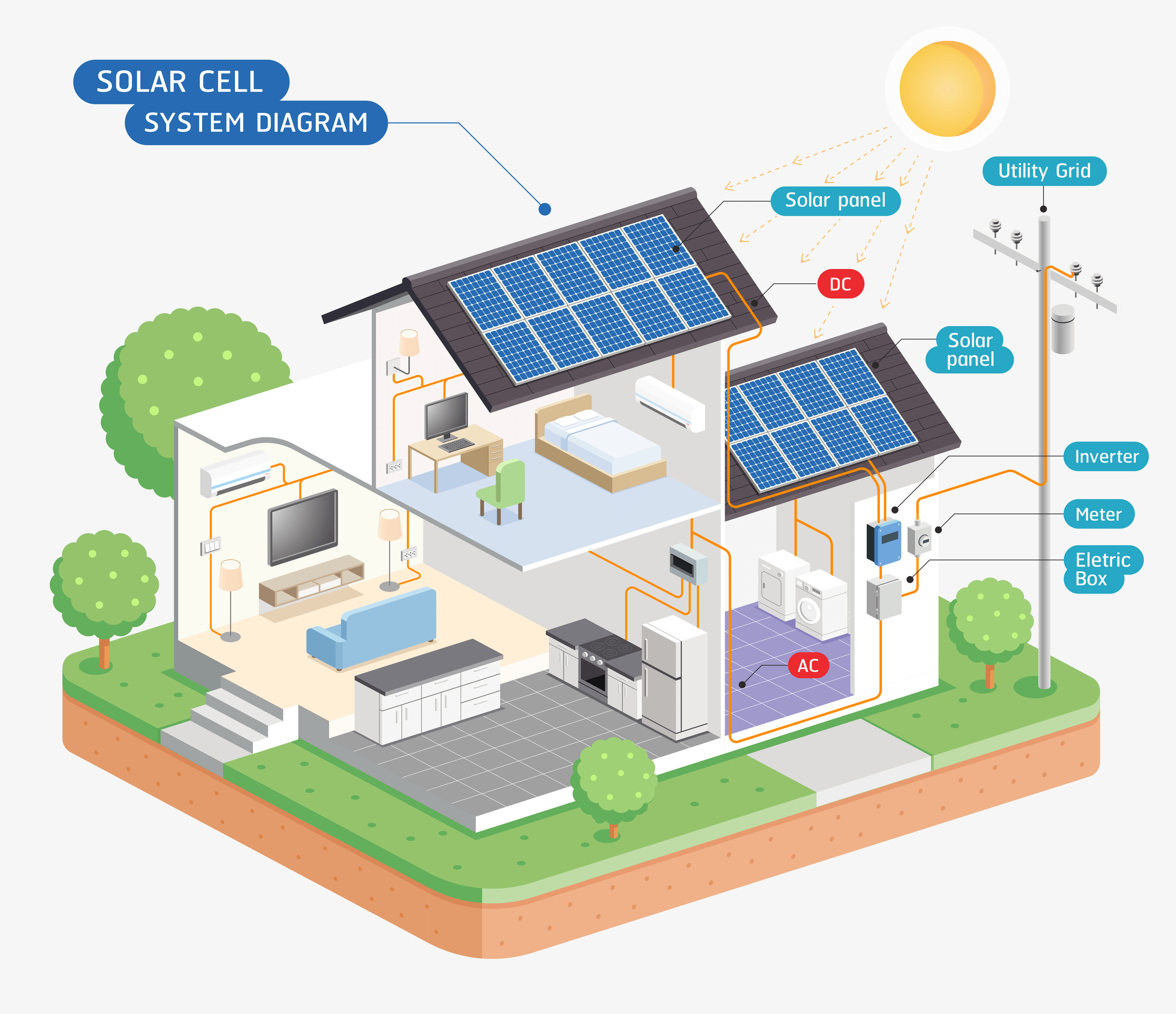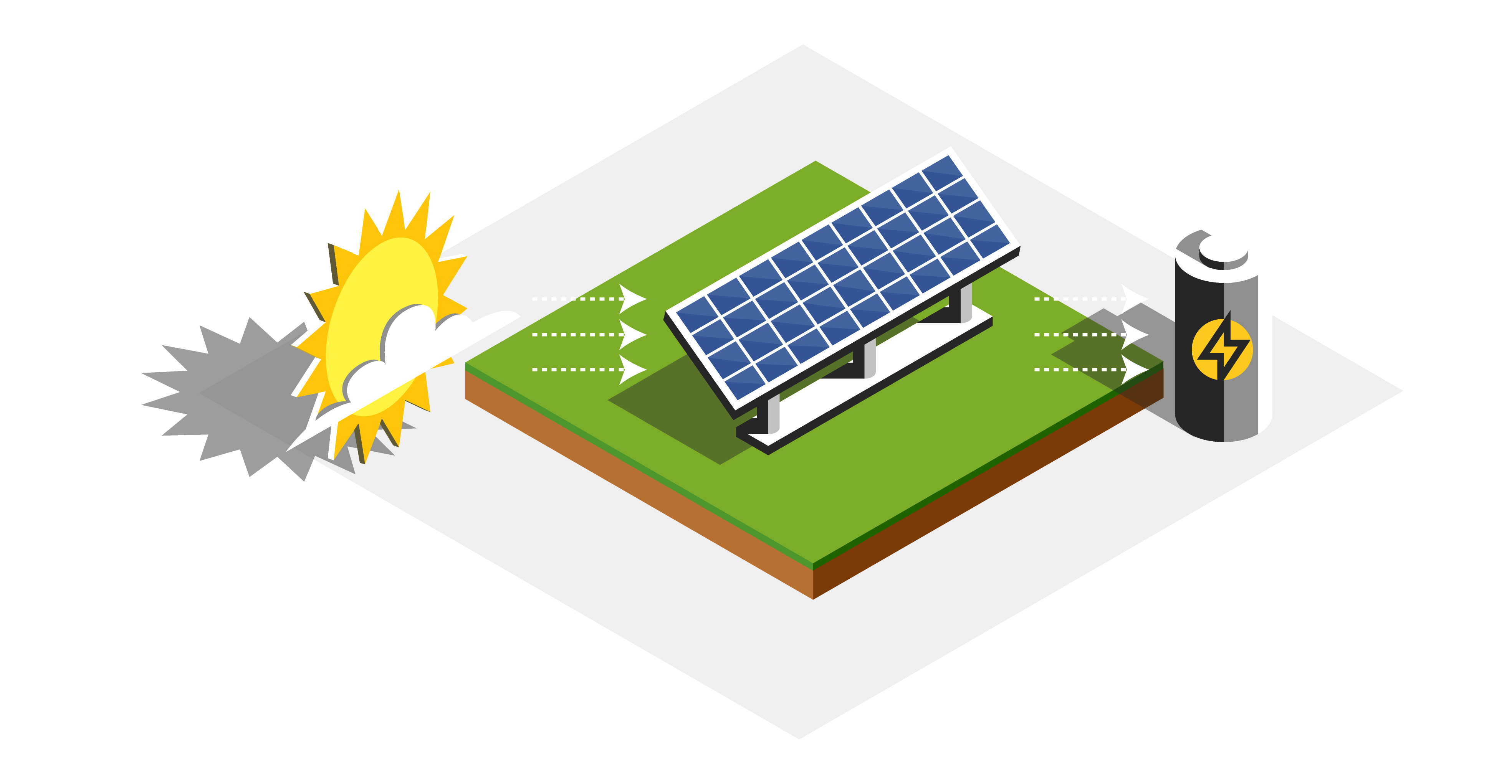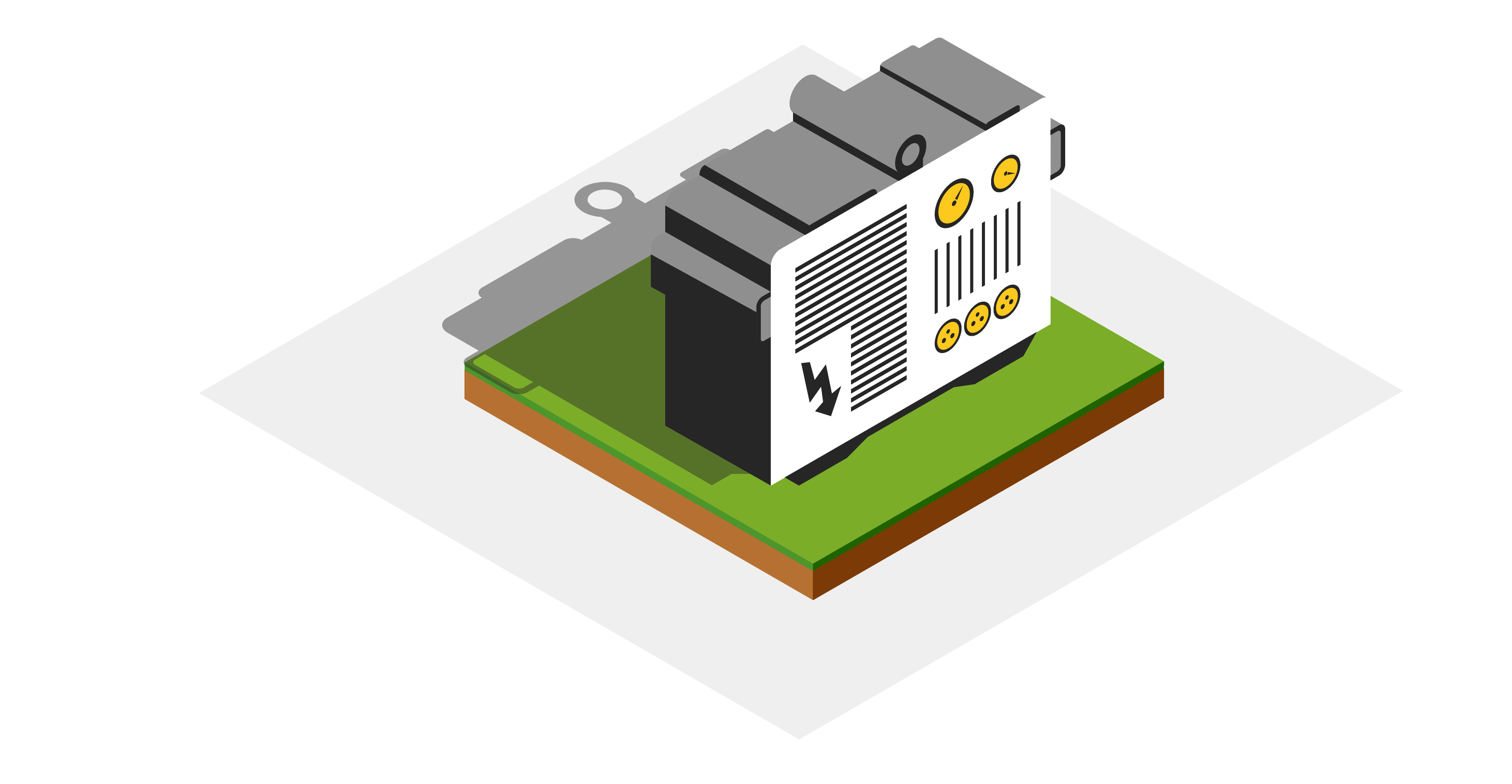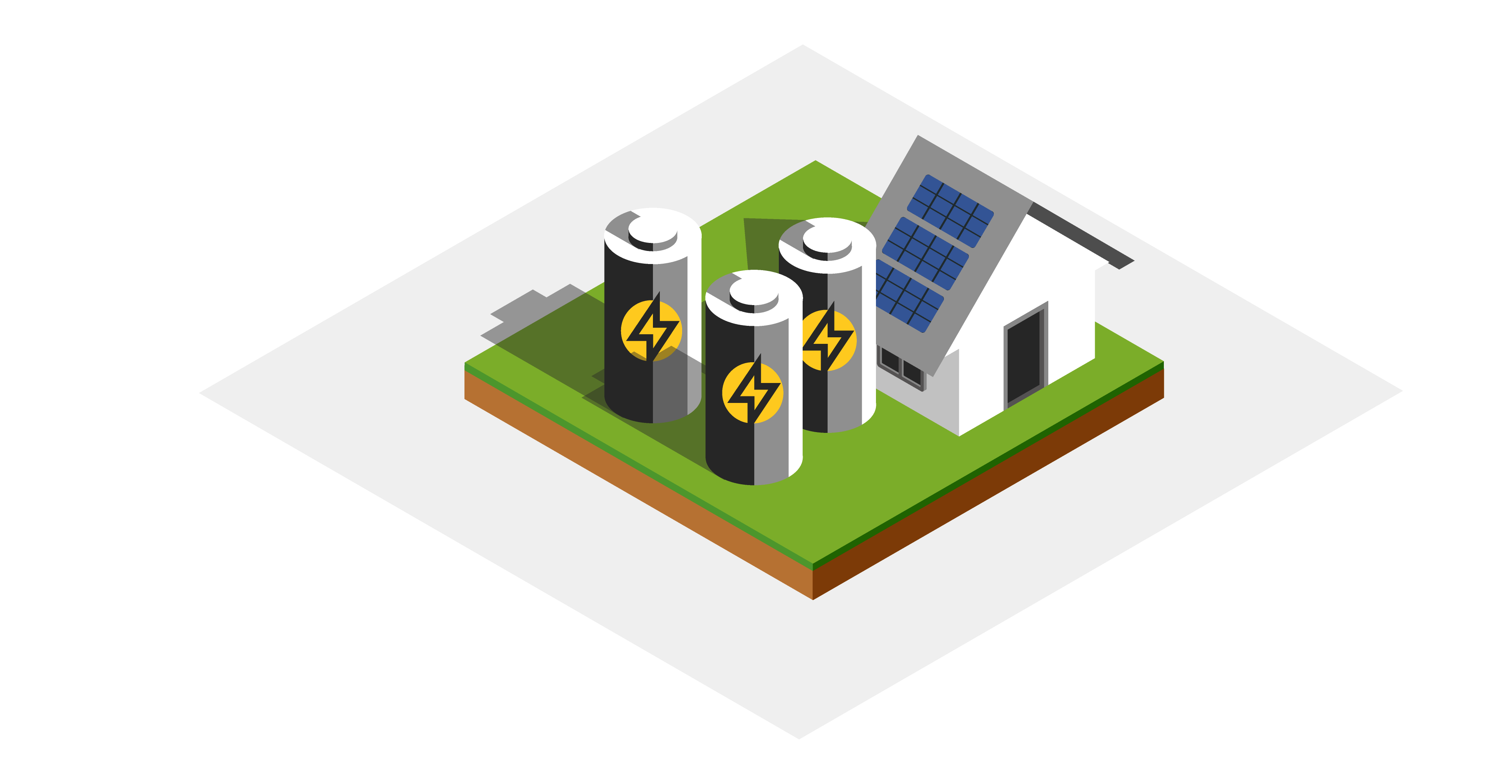State Solar Programs Offer Huge Incentives
Enter basic information to see if your home qualifies!

Solar energy is created by nuclear fusion inside the sun, where hydrogen atoms collide and fuse to form helium, releasing tremendous energy. That is an encyclopedic solar energy definition, but it underplays the role of solar energy in our lives. Without solar energy, there wouldn’t be life on Earth.
Here, we cover the following exciting solar energy topics.
Solar panels capture free sunlight and transform it into the power your house runs on. As energy rates climb, more and more homeowners are “going solar” to save money. The savings start instantly with system activation—the first kilowatt of solar energy you capture with a home solar energy system is one less kilowatt you must buy from the utility/electric company.
Solar energy systems are highly customizable to fit almost any home or business anywhere. While solar power generation depends on peak sunlight hours, solar panels can generate affordable, clean energy under cloudy skies, rain, and snow. Multiple roof styles can be accommodated, or you could avoid the roof entirely by mounting solar panels on the ground in the corner of your yard or other places on your property.
EnergyBillCruncher can connect you with solar panel experts serving your area so you can estimate your potential solar savings, given the particulars of your property and your household solar energy needs.



When you buy solar panels, you become eligible for numerous lucrative solar incentives and rebates, both public and private, statewide and nationwide.
Let's start with the whopping 30% solar tax credit you can claim the same year your home solar energy system is installed. The Solar Investment Tax Credit puts about a third of the cost of solar panels back in your pocket. This hefty credit is enough for ordinary home solar energy systems to cover solar installation.
City and state governments also reward those who buy solar panels because renewable energy systems take the strain off utilities. Combining government solar incentives, solar manufacturer rebates, and net metering can add impressive savings upfront. At the same time, you save more money every month through the ongoing capture of solar energy.
The utility company might buy your unused solar energy, so you can make money by selling your unused energy back to the grid. (Net metering for solar energy varies by state.) When the power bill arrives, the energy you sold appears as a credit. This credit offsets the solar energy you bought, and you only pay the difference (the net). This tremendous solar incentive is available to millions of homes with solar panels, and the details depend on the state and the utility companies.
Some states, municipalities, and utility companies offer solar cash rebates to encourage solar energy production. Rebates can reduce your system costs by 10% to 20%. Such programs usually expire once a region reaches its solar energy milestones, so early solar panel adopters are the ones who win.
In some states, you can sell the extra solar energy you capture to utility companies, who need it to make up a shortfall in their production. The output from your solar system earns you Solar Renewable Energy Certificates (SRECs). Utility companies buy the certificates to close the gap between what the state requires them to produce and what they have. The value of an SREC fluctuates wildly depending on location, supply, and demand.
Performance-Based Solar Incentives or PBI policies pay based on the actual solar energy produced by the solar system over a certain period rather than a single rebate at installation. PBIs have proven effective in getting solar installers and owners to focus on sound solar panel structure and maintenance. A meter on the solar system tracks the power, and payments are made accordingly. For example, solar incentives are paid monthly for five years (60 payments) based on actual meter readings in California.
In more ways than one, solar panels pay for themselves. First, the monthly savings you realize with solar panels will accumulate to cover the system's cost sooner than you might think—typically in seven or eight years. With excellent solar manufacturing standards and common 25-year warranties, your home solar energy system will still be young and robust at the seven-year mark.
Second, a well-documented correlation exists between solar panels and increased property values. A solar energy system for your house could boost the property value by around 4%. That's how much more buyers are willing to pay, on average, for a home with solar panels.
Solar panels are the clear winner compared to many other home improvement projects. After a few years, a home solar energy system will have paid for itself, and from that point on, you will enjoy all the perks of saving by switching to solar. Investing in solar panels will undoubtedly increase your property value and equity.
The primary solar energy advantages include:
Here are some possible solar energy disadvantages:
Solar isn't just an energy industry; it's a technology industry. The tech has made major leaps and bounds from the first experimental photovoltaic (PV) panels in 1954 to today's record-holding, most efficient monocrystalline panels.
Meanwhile, electricity rates generally go in one direction: Up! That's why the value proposition of solar energy keeps improving. Clean solar energy gets cheaper to harness yearly, while the grid power it competes with can't help but get more expensive.
Consider all the ways solar keeps getting more affordable compared to the only real alternative people have, which is to buy power from the grid.
In response, what can utility companies say? They will only raise their rates less often. But they know they have you by the short hair because you must power your home. That brings us to another benefit of solar energy's value proposition, which we could have listed above: You get a degree of energy independence when you switch to solar energy.
Several advances in the solar energy industry simplify the design and installation of a home solar energy system. For instance, using computer-aided design (CAD) and virtual walkthroughs, the ideal solar energy setup can be determined before the solar panel installation starts.
Local solar installers will determine where solar panels would be most beneficial on your home's roof or property and the optimum number of solar panels you might install to replace the energy you currently buy. Once the high-quality parts have been acquired, installing a home solar energy system typically takes only two or three days.
Now that more local governments support streamlining solar permitting, solar panels can be activated in as little as a day. Otherwise, it may take several days for the solar system to be confirmed and to establish a connection to the grid.
Like all vital technological industries, solar energy adapts and thrives on innovation. One reason the solar energy business meets the needs of millions of people is that it offers levels to match any homeowner's commitment.
| How | Avg. savings | Owner |
|---|---|---|
| Power Purchase Agreement, PPA | 20% to 30% | Solar Leasing Company |
| How | Power Purchase Agreement, PPA |
|---|---|
| Avg. savings | 20% to 30% |
| Owner | Solar Leasing Company |
Your solar savings will be modest at this level, but this option offers something the others can't match: a potential price tag of $0 (zero) upfront. You enter into a PPA with a solar company. You agree to buy the power generated by the solar panels while the company pays for the solar energy system, the installation, and the maintenance. The rate you pay for electricity will be lower than you currently pay; that benefits you.
| How | Avg. savings | Owner |
|---|---|---|
| Lease | 20% to 50% | Leasing Company |
| How | Lease |
|---|---|
| Avg. savings | 20% to 50% |
| Owner | Leasing Company |
Option two is solar leasing, which appeals to many people, just as leasing an automobile does. The solar energy system is yours to use for the length of the contract, generally 20-25 years, but you don't own it. You make monthly lease payments for the solar system while enjoying lower energy bills, and you still come out ahead compared to where you'd be if you had to buy all your electricity from the utility company.
| How | Avg. savings | Owner |
|---|---|---|
| Cash; Solar Loan | 70%; potentially 100% and beyond with net metering | You |
| How | Lease |
|---|---|
| Avg. savings | 20% to 50% |
| Owner | Leasing Company |
At last, we come to the ultimate solar panel investment option if you can swing the upfront solar installation costs. Initially, it's a case of, "You gotta spend money to save money." As the solar system owner:
Financing is readily available for switching to solar, so you don't need cash. You can repay a solar energy loan while saving on every energy bill and break even.
Solar panels are primarily self-cleaning, meaning they benefit from occasional wind, rain (and gravity) to look sparkling new. Dead leaves might blow onto your solar panels but blow right off. Dust might accumulate, but it rinses away in the next rain. Even snow doesn't harm solar panels—remarkably; solar panels generate electricity in snowy weather because ice crystals convey light downward to the cells. Occasionally, sweeping accumulated debris off your solar panels might be necessary every once in a while to maintain cleanliness.
The 25-year warranties (or longer) accompanying solar panels testify to their high quality and durability. Choose panels made by well-known manufacturers over cheap DIY solar panels, and you’ll be all set.
Different households require different solar energy requirements. Some homes are equipped with EnergyStar appliances, others with legacy units the house came with. Some don’t need air conditioning, while others couldn't get through a summer without it. Some have one or two residents, others four or more.
Here are the ideal capacities of grid-connected solar energy systems based on household size. It's important to remember that even a minor solar energy system will lower your energy costs considerably, even if it isn't powerful enough to replace the whole bill.
What you can run:
Your ideal solar panel system: 1.5 kilowatts
What you can run:
Your ideal solar panel system: 3 kilowatts
What you can run:
Your ideal solar panel system: 5 kilowatts
These estimates assume that the solar panels will be chosen from the higher end of the quality scale (higher power rating, more efficient) and that most home devices and appliances are energy-efficient.
Solar companies will use formulas to find your energy needs in terms of kilowatt-hours (kWh), the same unit of measure the utility companies state on your bill, so that you can compare.
In the most straightforward setup, only two pieces of equipment are needed to transform sunlight into electricity. You must have at least one solar panel to absorb direct sunlight and an inverter to change the current from DC to AC. Some homeowners add a battery to their solar energy system, which often necessitates adding a charge controller.
Solar panels come in three types, with the most efficient being the monocrystalline solar panel. This solar panel type is the most common. A newer polycrystalline solar panel is approaching the efficiency of monocrystalline, thanks to manufacturing advancements, and it costs less to make. Finally, special applications can use a third, flexible solar panel known as an amorphous solar panel. While inefficient, amorphous panels cost the least to manufacture and can conform to odd surfaces.
When you customize your home solar energy system with the help of an expert installer, you will face the question of whether to add a solar battery as a backup. A solar battery is optional and will add to the total price, but it has definite advantages.
Homes connected to the power grid don't require a battery because the grid is their virtual battery. They draw on solar energy during the day and from the grid at night, and excess production doesn't need to be stored in a battery because the grid will gladly absorb it (and credit the homeowner for its value, depending on which state offers). On the other hand, off-the-grid homes need a battery to store electricity until needed.
Solar battery backup proves its value in a crisis and daily life. A solar battery attached to your home solar energy system will provide quiet, dependable power in a power outage, such as after a weather emergency or possible grid failure. When the solar panels are in the shade or at night, your home can draw from the solar battery rather than buy electricity from the utility company.
The downside of a backup solar battery is that it will significantly increase the cost of your home solar energy system, so if your area is not prone to power failures, a solar battery probably won't be worth the investment. As for being able to draw on the solar battery at night, buying power from the grid at night will probably be cheaper than the price of a battery divided by the kilowatts you get from it during its life. That is unless electricity rates go through the roof.
If you can't decide on a solar battery backup option when designing your home for a solar energy system with the help of a local solar expert, rest assured that it's often possible to add a solar battery down the road. Or you may take advantage of the increasing number of solar package deals that bundle solar panels with batteries, making solar more affordable.
Going solar is a big decision, but you won't always face considerable up-front costs. The four common ways to finance a home system are buying it outright, taking out a loan, leasing it, or entering into a power purchase agreement (PPA).
Whether you buy your solar panel system outright or with a loan, the system belongs to you and becomes a property feature, raising property value. Any solar tax credits in your area, plus the federal renewable energy tax credit, also belong to you. As the solar panel system's owner, its extra power is also yours to sell to the utility company if such an arrangement is offered where you live.
Many homeowners choose to go with leasing or a power purchase agreement when purchasing a solar panel system to avoid the up-front costs. Either way, a third party owns the solar system, meaning any credits or incentives and any profit from selling excess energy to the utility belongs to them.
First, it is reassuring that solar panels are not designed and manufactured with only year-round sunshine in mind. Although solar panels are more prevalent in states like Arizona, California, and Florida, they are built to withstand various climates.
As such, solar panels are winter-ready out of the box. Besides clearing them after a heavy snowfall, you don't need to do anything extra for your solar panels in winter.
Solar panels are subjected to various stress tests during manufacture to receive the Underwriter's Laboratories (UL) certification. Solar panels stand up to bad weather exceptionally well. The Energy Department's National Renewable Energy Laboratory analyzed 50,000 solar panel systems over six years and found that only 0.1% reported trouble from damaged or underperforming modules. This speaks to the high quality of solar panels.
The laboratory wrote: "Despite hurricanes, hail, shading, vandalism, and hook-up delays, approximately 85% of all systems each year produced 90% or more of the electricity predicted, and the typical system produces more electricity than predicted. Year-to-year comparisons suggest that the degradation rate—the gradual loss of energy production—is in the historical range of 0.5%-1% per year."
Our solar partners will walk you through all the options. That said, based on your income, credit score, and DTI (debt to income ratio), the solar installer you choose can guide you to the most cost-effective and sensible option to get your solar system up and running. Solar loans (and solar leases) are prevalent because you can install the solar system with zero out-of-pocket. Owning the solar system has advantages, too, such as the most solar incentives available.
Yes, 100%. This wildly popular option waives the upfront costs, so you can install solar panels and save money without opening your wallet. Many homeowners using EnergyBillCruncher got their entire solar energy system installed without any money down.
The solar installers in our vast network have extensive experience with solar rebates, incentives, tax credits, and money-saving bundles. When you explore your options with our solar experts, they'll ensure you maximize all available perks. Owners of solar energy systems qualify for the most incentives, but solar leasing and power purchase agreements have generous benefits, too.
At EBC, we proudly promote clean, renewable solar energy. Let us be your portal to the tremendous solar savings potential for a home solar energy system. We connect homeowners to friendly local solar installers every day. Our solar incentives resource pages are updated regularly by state. And our blog is full of exciting advice for saving money with solar energy and much more.

EnergyBillCruncher is an unbiased and free online resource created to benefit homeowners. Join our newsletter & stay up-to-date with the latest solar news.